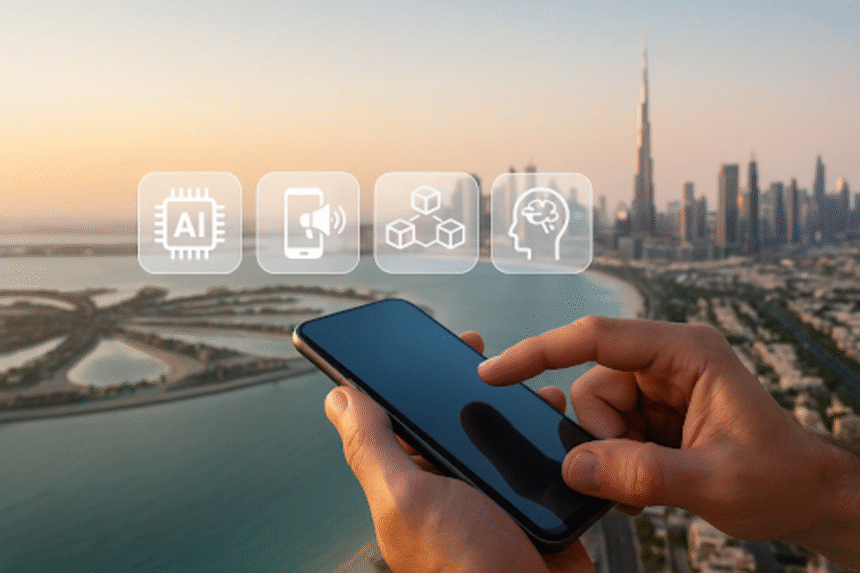2025 looks big for mobile apps in Dubai. This city isn’t slowing down—it’s picking up pace, especially in the tech space. A trusted mobile app development company in Dubai now plays a major role in shaping how businesses adapt and grow. With smart government initiatives like Dubai 10X and Smart Dubai 2025, businesses are keen on building apps that feel meaningful, useful, and—most importantly—engaging.
Let’s talk about what’s really happening with mobile apps in the city and what businesses are paying attention to. These trends are helping companies connect with users in better, faster, and more flexible ways.
1. AI & ML Are Personalizing Everything
Apps today don’t just respond—they guess what users might want next. AI (Artificial Intelligence) and ML (Machine Learning) help apps recognize patterns, respond faster, and shape experiences that actually feel human.
In a city like Dubai where people are used to high service standards, this level of personalization is quickly becoming expected.
What AI is helping apps do:
- Recommend items that match user interests
- Adjust content based on real-time behavior
- Offer quicker, smarter chat support
A smart app development company in Dubai will already be working AI into retail, health, finance, and more. PwC estimates AI could add up to $96 billion to the UAE’s economy by 2030. That’s a massive push—especially in digital sectors.
And it’s not just about big numbers. People appreciate being seen. Studies show 80% of users are more likely to buy from a brand that personalizes their experience.
2. People Want It Now: The On-Demand Boom
You can’t ignore how quickly expectations have changed. People in Dubai want things delivered now—groceries, laundry, medical advice. And they want it done easily.
This shift is fueling a whole category of apps:
- Food delivery platforms with real-time tracking
- Healthcare apps offering same-day appointments
- Home services that show up at your door in under an hour
By the end of this year, on-demand services in Dubai could reach AED 4 billion. That’s a clear sign that convenience is the currency. Whether you’re a startup or a small local business, this model is now a serious opportunity.
And here’s what people won’t wait for: buggy interfaces, delays, or unclear communication. Companies building on-demand platforms are now focused just as much on how things feel as how they work.
3. AR and VR Are Going Practical
What used to feel like tech demos are now everyday tools. Augmented Reality and Virtual Reality aren’t just about games or gimmicks anymore—they’re making everyday decisions easier.
Examples in Dubai:
- A real estate firm lets users “walk through” a new apartment on their phone
- A clothing brand offers virtual try-ons to cut return rates
- A tourism app shows you nearby landmarks with interactive overlays
Dubai has always loved experiences. Now that AR and VR are easier to use and cheaper to build, more businesses are experimenting. And users are responding.
Statista predicts AR/VR in MENA will hit over $6 billion by 2026. For retailers, educators, and even healthcare providers, this isn’t a maybe—it’s an opportunity now.
4. Blockchain = Trust, and Trust Matters
Let’s face it—users are skeptical. They want to know their information is safe and transactions are secure. That’s where blockchain is stepping in.
Dubai has big plans here. With 50% of public services shifting to blockchain-backed systems, it’s clear the private sector is moving in the same direction.
What’s happening inside apps:
- Payment verification without intermediaries
- Encrypted health records users actually control
- Real-time shipping logs that are public and tamper-free
These features aren’t just fancy. They make life easier and safer—for both the business and the customer.
More than 40 blockchain projects were already underway in Dubai by 2024. The idea isn’t hype anymore. It’s real—and spreading fast across sectors.
5. PWAs + 5G = Smooth, Instant, Low-Cost
Progressive Web Apps (PWAs) have been gaining steam globally, but in Dubai—with high-speed 5G—they’re an especially good fit.
What makes PWAs attractive?
- You don’t need to download them
- They work offline
- They load almost instantly
Paired with widespread 5G (which now covers almost every urban area in the UAE), these apps feel just as fast as native ones. That matters in a city where people are used to services that work flawlessly.
Plus, businesses like them because they’re less expensive to build and maintain.
Bonus Trend: Voice Tech Is Quietly Taking Over
Look around, and you’ll see more people talking to their phones. Whether it’s Google Assistant, Alexa, or Siri—voice interfaces are being built into apps that once only worked by tapping.
Why people like voice:
- It’s faster
- It’s easier to use while multitasking
- It helps those with accessibility needs
Dubai’s multi-language population adds a twist—apps here need to recognize multiple languages and accents. That means developers are paying more attention to voice AI that works well across cultures.
And with smart homes and wearables on the rise, voice features are only going to get more common.
Dubai Is Set Up For This
This city isn’t waiting. With government-backed tech hubs, startup accelerators, and steady investment, Dubai has built a space where mobile app innovation happens every day.
From logistics to e-learning, finance to fashion—every sector is experimenting. If you’re planning to build an app, teaming up with a mobile app development company in Dubai gets you closer to both your users and the pace of the market.
And if you’re curious about broader tech updates across the region,BlogVP is a solid source.
One Last Thing
Trends can feel like buzzwords. But the ones we’ve covered are grounded in what people actually want—and what businesses are doing to meet those wants.
You don’t have to follow every trend. But ignoring all of them? That’s a risk.
The best mobile apps in 2025 won’t be the flashiest. They’ll be the most helpful, the most human, and the most aligned with what users actually need.
That’s where the real value is.






